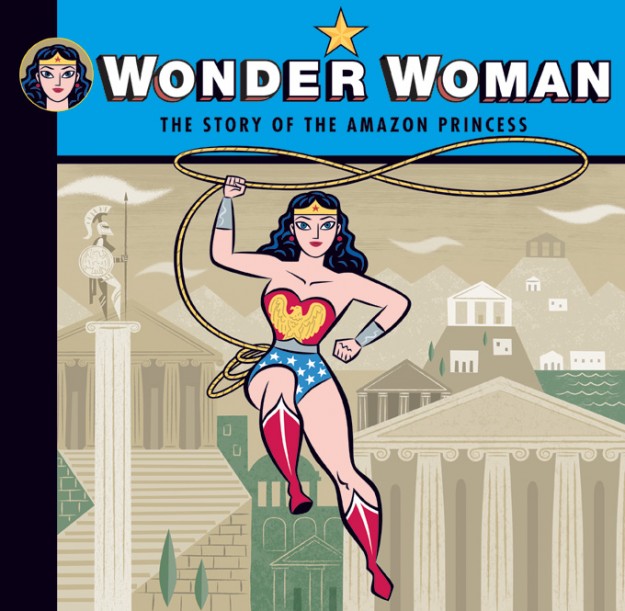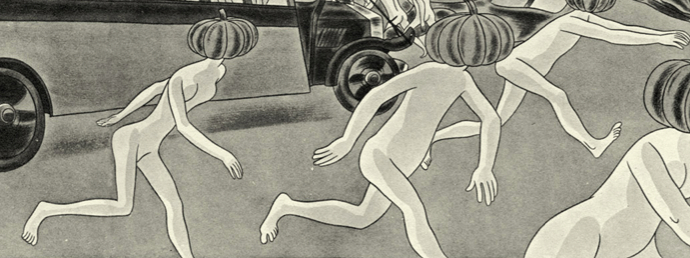* DC pitched Grant Morrison on writing a Watchmen sequel; he declined. That tidbit comes from the Mindless Ones’ very fun interview with Morrison.
* Rob Clough examines the oeuvre of Dave Kiersh, perhaps the most underappreciated cartoonist of the last decade-plus given how present his nostalgia-tinged tone poems about the teenage wasteland are in the zeitgeist. And what a dreamy picture of him, too!
* People are organizing protests of the DC relaunch at the San Diego Comic-Con and of Odd Future at the Pitchfork Festival. Why not, says I. As silly as that pairing makes it all seem, the comment thread at the link is a surprisingly thoughtful conversation about the uses and limits of protest.
* Matt Zoller Seitz has launched a new group blog called PressPlay, dedicated primarily to video essays. That’s something to get excited about.
* 300: Battle of Artemisia — wow, that really rolls off the tongue.
* J. Caleb Mozzocco joins Robot 6 with a post on Ralph Cosentino’s Wonder Woman children’s book. Cosentino has done similar books on Superman, which I haven’t seen, and Batman, which is one of the best Batman anythings I’ve ever read. If he can distill WW’s milieu and appeal as beautifully as he did Batman’s, his book should be issued to DC executives.
* Thrilled to see What Things Do posting more Abner Dean.
* Finally, a couple of quotes that have been resonating with me since I read them.
Clarence’s ability to enjoy Clarence was incredible.
–from Bruce Springsteen’s eulogy for Clarence Clemons (via Pitchfork)
RUDICK: Did the Surrealism exhibition that you saw in 1968 have a similar effect on you?
WOODRING: That hit me harder and lasted longer than anything else I’ve ever seen.
RUDICK: What was it about that body of work that had such an impact on you?
WOODRING: I was still in high school. I didn’t know Surrealism existed. I just went with some people I knew down to the L.A. County Museum of Art to see this huge Surrealism and dada retrospective. I had no expectations. The first thing that I saw when I walked in the door was The Song of Love by Giorgio de Chirico, with the plaster cast and the red rubber glove. I saw that and my mind just started racing, trying to understand it because it had such a mood of such intensity, and I was thinking, A red rubber glove? Why is that affecting me like this? What is going on here? It’s like magic.
It was really an all-star show, and they had the crème de la crème: Dalí’s best paintings, Max Ernst’s best paintings, Victor Brauner, Magritte, Hans Bellmer. I didn’t really understand it at the time, but I went back to see it a second time and realized, God, this stuff is just bristling with sex energy. These guys must’ve thought about sex all the time. Dalí’s Great Masturbator was there, and various libidinous Magrittes, Max Ernsts, and especially the Hans Bellmer stuff. It was just so heavily erotic that I, virgin that I was, thought, Sex is magic. It’s where all this hallucinatory power comes from.
My parents were very conservative, and all their friends were conservative—it was a very unresponsive, unnurturing environment for me. I learned from that show for the first time that there were adults who worked hard at unraveling those mysteries and capturing and putting them down. I had no idea. I just thought that I was stuck off in a corner of the universe by myself, and I’d never find a tribe of people to relate to or people to confirm what I was believing. It was like being reborn, seeing that this world of possibilities existed, to say nothing of the work itself, which was so heavy and intense and enjoyable. The pleasure I felt from seeing that stuff lasted for weeks afterward—years, really. I still get a frisson thinking about it.
–from Nicole Rudick’s interview with Jim Woodring in The Comics Journal
Tags: Carnival of souls, comics, links, movies, music



